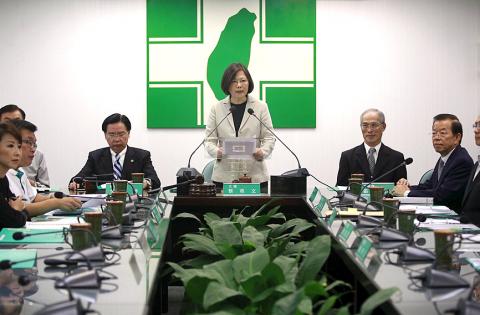Democratic Progressive Party (DPP) presidential candidate Tsai Ing-wen (蔡英文) yesterday lashed out at President Ma Ying-jeou’s (馬英九) planned meeting with Chinese President Xi Jinping (習近平), calling it a manipulation of the January elections and labelling the decisionmaking process as opaque.
“Now is a sensitive period of time as election campaigns are underway in Taiwan, and the public would definitely question whether [the president] is intending to influence the election result by holding a Ma-Xi meeting,” Tsai said.
“If the Chinese Nationalist Party [KMT] always chooses to politically manipulate cross-strait issues ahead of elections, it would have a negative impact on the cross-strait relationship in the long run and would not win support from the people of Taiwan,” she said.

Photo: Reuters
Saying she was shocked upon learning late on Tuesday that Ma is to meet Xi, Tsai panned the decisionmaking process as harmful to Taiwan’s democracy.
“I would like to stress that, we would be happy to see normal cross-strait exchanges based on equality and dignity, openness and transparency, and no political talks,” Tsai said, adding that news of the meeting has triggered questions and doubts from the public because people have lost confidence in the government when it comes to cross-strait exchanges and do not want to see any more opaque decisionmaking.
“I must point out that Ma’s term as president will soon be ending, we therefore would absolutely not allow him to promise something that he cannot be responsible for to gain political reputation for himself,” Tsai said. “He has no right to do so.”
Tsai said that the DPP would keep an eye on the meeting.
In a separate press conference, DPP spokesperson Cheng Yun-peng (鄭運鵬) said that when running for re-election, Ma promised he would not meet with the Chinese leader during his term as president.
“Now that he was in such a rush to arrange a meeting in an opaque way, we demand that he clearly explain to the public why he has to meet with Xi at this time,” Cheng said. “How has he been in touch with the Chinese? How will the meeting proceed, what will he say and what he will do?”
Cheng said that as president, Ma must remember to defend Taiwan’s sovereignty and dignity, and refrain from making moves that would misguide the international community, as well as not make any political promises or sign any documents.

DAREDEVIL: Honnold said it had always been a dream of his to climb Taipei 101, while a Netflix producer said the skyscraper was ‘a real icon of this country’ US climber Alex Honnold yesterday took on Taiwan’s tallest building, becoming the first person to scale Taipei 101 without a rope, harness or safety net. Hundreds of spectators gathered at the base of the 101-story skyscraper to watch Honnold, 40, embark on his daredevil feat, which was also broadcast live on Netflix. Dressed in a red T-shirt and yellow custom-made climbing shoes, Honnold swiftly moved up the southeast face of the glass and steel building. At one point, he stepped onto a platform midway up to wave down at fans and onlookers who were taking photos. People watching from inside

A Vietnamese migrant worker yesterday won NT$12 million (US$379,627) on a Lunar New Year scratch card in Kaohsiung as part of Taiwan Lottery Co’s (台灣彩券) “NT$12 Million Grand Fortune” (1200萬大吉利) game. The man was the first top-prize winner of the new game launched on Jan. 6 to mark the Lunar New Year. Three Vietnamese migrant workers visited a Taiwan Lottery shop on Xinyue Street in Kaohsiung’s Gangshan District (崗山), a store representative said. The player bought multiple tickets and, after winning nothing, held the final lottery ticket in one hand and rubbed the store’s statue of the Maitreya Buddha’s belly with the other,

‘NATO-PLUS’: ‘Our strategic partners in the Indo-Pacific are facing increasing aggression by the Chinese Communist Party,’ US Representative Rob Wittman said The US House of Representatives on Monday released its version of the Consolidated Appropriations Act, which includes US$1.15 billion to support security cooperation with Taiwan. The omnibus act, covering US$1.2 trillion of spending, allocates US$1 billion for the Taiwan Security Cooperation Initiative, as well as US$150 million for the replacement of defense articles and reimbursement of defense services provided to Taiwan. The fund allocations were based on the US National Defense Authorization Act for fiscal 2026 that was passed by the US Congress last month and authorized up to US$1 billion to the US Defense Security Cooperation Agency in support of the

HIGH-TECH DEAL: Chipmakers that expand in the US would be able to import up to 2.5 times their new capacity with no extra tariffs during an approved construction period Taiwan aims to build a “democratic” high-tech supply chain with the US and form a strategic artificial intelligence (AI) partnership under the new tariffs deal it sealed with Washington last week, Taipei’s top negotiator in the talks said yesterday. US President Donald Trump has pushed Taiwan, a major producer of semiconductors which runs a large trade surplus with the US, to invest more in the US, specifically in chips that power AI. Under the terms of the long-negotiated deal, chipmakers such as Taiwan Semiconductor Manufacturing Co (TSMC, 台積電) that expand US production would incur a lower tariff on semiconductors or related manufacturing